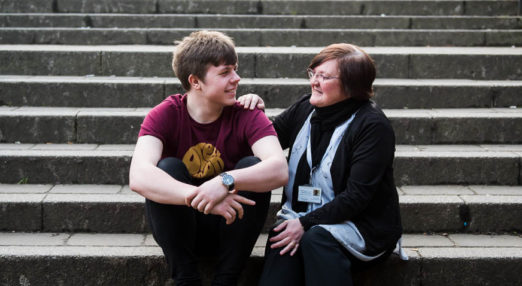VSS respond to Scottish Sentencing Council consultation on sentencing young people guidelines
Chloë Minish, our Policy and Research Officer, writes about the recent submission from Victim Support Scotland on the draft sentencing guidelines for young people. Chloë looks at the challenge of accounting for age and maturity without discounting the impact of crime for the vicitm.
The Scottish Sentencing Council recently held a consultation into its guidelines for the sentencing of young people. This followed the publication of a review of research by the University of Edinburgh in February 2020, which demonstrated that the adolescent brain continues to develop into adulthood and does not reach full maturity until approximately 25-30 years of age.
The research review found that ‘brain development may be delayed or hindered by other factors such as mental disorders and distress, adverse childhood experiences, traumatic brain injury (“TBI”), and alcohol and substance use’ and noted that there is a ‘well-established correlation’ between TBI and antisocial behaviour and violent offending. In particular, it finds that a TBI suffered during adolescence can be more damaging as it interrupts the development of the brain.’
While these findings are valid and should not be dismissed, it is important to highlight that the long-lasting and often devastating impact of crime is often felt by the victim, irrespective of if the crime has been committed by a child, young person or adult. Maturity and age are subjective but must not detract from justice being served to people affected by crime.

In relation to driving offences, the response lodged by Scotland’s Campaign against Irresponsible Drivers (SCID) noted, all individuals are required to pass a competence test in order to be deemed safe to drive a vehicle. Age is not the determining factor in offences which result from careless or dangerous driving. More consideration is needed as to how the sentencing guidelines can be applied in such instances or if it is appropriate for them to be waived.
The draft guidelines for sentencing young people are geared towards promoting rehabilitation over custodial sentences, asserting that:
Rehabilitation is a primary consideration when sentencing a young person. Young people should be provided with the opportunity to change, and to move away from past offending behaviour. The judge should therefore seek to reduce, through rehabilitation, the risk of reoffending, and to identify the features which are likely to make the sentence particularly effective.
While the sentiment of providing second chances is an honourable one, this neglects to acknowledge the severity that the actions of a young person has on a victim. Some rehabilitation measures place the needs of the perpetrator ahead of the needs of victims. In doing so, this has the potential to add to the trauma which the victim has experienced. The impact of this should not be underestimated.
In determining an appropriate sentence much weight is placed on the offender’s mitigating circumstances, for example, the effect of offenders’ sentence on family, employment, determination to address drink/drug issues etc. Clearly there are times when considering these circumstances is important. But the continuing traumatic impact of crime on those directly affected, and their support network of friends and families, should be front and centre of our justice system.
If sentencing fails to acknowledge the impact that the actions of any perpetrator has had on their victim then this is a failure of the criminal justice system as a whole.
It is vital that, when accounting for the age and maturity of the perpetrator, an unclear or unjust process of sentencing does not emerge.
Latest news and blogs
-

Children (Care and Justice) (Scotland) Bill: Stage 3 Debate
At Wednesday’s debate on Stage 3 of the Children (Care and Justice) (Scotland) Bill, we’re asking members of the Criminal Justice Committee to consider the rights of victims who are harmed by 16 and 17-year-olds. Read our briefing to MSPs.
Read more
-

Remote evidence suites
Victim Support Scotland receives £500,000 funding from Scottish Government for specialist remote evidence suites
Read more
-

Victims, Witnesses, and Justice Reform Stage 1 debate
At today’s debate on Stage 1 of the Victim’s, Witnesses, and Justice Reform (Scotland) Bill, we’re asking members of the Criminal Justice Committee to keep victims’ views at the heart of their decision-making. Read our briefing to MSPs:
Read more
-

Victims’ charity seeks support to uphold victims’ rights
Victim Support Scotland, Scotland’s leading national charity for victims, is urging MSPs to consider victim support and information needs in the Children (Care and Justice) (Scotland) Bill as the debate of Stage 3 of the Bill approaches on 24 April.
Read more
-

Join Victim Support Scotland as a charity Trustee
Are you an exceptional leader, ambitious for change to improve victims’ and witnesses’ experiences of the criminal justice system? Leading charity VSS is looking for high calibre and committed professionals to join our Board of Trustees.
Read more
-

The importance of feedback
We always seek to hear from individuals affected by crime about their experiences with our services. This is crucial to ongoing learning and improvement within our work and in informing others about how our support can make a difference. We particularly encourage those who have experienced harm caused by children and young people under 18 to share their views.
Read more
-

Minister goes to court to learn about services for victims and witnesses
As part of Victims’ Awareness Week, Minister for Victims and Community Safety Siobhian Brown visited Edinburgh Sheriff Court for a familiarisation visit.
Read more
-

Bex’s story
Read more
-

Campaign launches to support more victims of crime – press release
Read more
-

Student Volunteering Week – Priya’s story
Read more
-

Student Volunteering Week – Anna’s story
Read more
-

Victim support organisations sign open letter calling for anonymity for children who die as a result of crime
Read more














